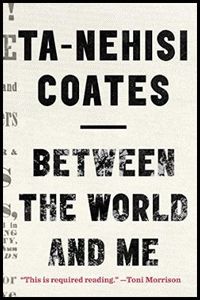 This is a book that I instantly wish I owned multiple versions of because I feel like I need to consume it in different ways for the weight of its words to fully sink into my consciousness. I finished the audiobook version of Between the World and Me by Ta-Nehisi Coates a couple of weeks ago and it was MARVELOUS! The book is part memoir, part current American history and is written as a letter directly to the author’s son. Because I knew that the book followed this format, I opted to purchase the audiobook from Downpour (if you like audiobooks and you aren’t a subscriber to Downpour, you need to get on board!!) as the author was the narrator and I wanted to hear the author’s intonations and emotions as he spoke his words.
This is a book that I instantly wish I owned multiple versions of because I feel like I need to consume it in different ways for the weight of its words to fully sink into my consciousness. I finished the audiobook version of Between the World and Me by Ta-Nehisi Coates a couple of weeks ago and it was MARVELOUS! The book is part memoir, part current American history and is written as a letter directly to the author’s son. Because I knew that the book followed this format, I opted to purchase the audiobook from Downpour (if you like audiobooks and you aren’t a subscriber to Downpour, you need to get on board!!) as the author was the narrator and I wanted to hear the author’s intonations and emotions as he spoke his words.
Coates is both a powerful speaker and writer. While he detailed the lessons that he was forced to learn as a black man growing up in America and contrasted them from the lessons his father had to learn and the lessons his son has already learned or will have to learn was incredibly poignant. The world has shifted significantly since his father was a child, but there is still so much room for the world and America’s culture to grow and improve. While his son currently leads a privileged life because of his father’s wealth and their family’s residence in Paris, France (all privileges Coates acknowledges), this doesn’t eliminate the ways that his son must prepare for how he will doubtlessly be seen as a young black man when he is in America. Regardless of any of his own characteristics or intentions, people will cast stereotypes upon his body and his mind and he will have to know how to evade or protect himself from them; hence, why Coates has chosen to write his son a series of lessons he has learned in his own life.
As a white woman, Between the World and Me truly illuminated the world that black parents must build and teach to their children — something that I never had to be taught by my own family. When I was a child, my innocence and piety were often assumed by strangers, but this isn’t the case for many black children who are often undeservedly assumed to be devious or guilty. One of the vignettes that stuck with me most clearly was when a white adult was extremely rude to Coates’s young son and Coates struggled to contain his anger in the face of assumptions and rights incorrectly projected onto his child. To hear this told from a parent’s perspective was heartbreaking and I admire Coates’s ability to so poignantly and clearly discuss how this affects him and his family on a micro-level, while simultaneously situating his personal experiences within historical and societal contexts.
Between the World and Me is very of the moment (because of the renewed, necessary spotlight on racial tension and inequality in America) and also of America’s history. I believe this book will be a touchstone that people reference decades from now when trying to convey the state of race in America in the early 2000s and Coates has done a remarkable job creating a piece that will last.
While I loved listening to this audiobook, I wish I also owned a physical version of this book so that I could highlight and come back to the most touching/provoking pieces with ease. I greatly valued hearing the author beautifully speak his story, something that most authors who aren’t trained entertainers struggle to do well. The audiobook was also quite a quick listening experience and clocked in at about 3.5 hours. My recommendation is to consume this in whatever way that it comes into your life and then consume it again and again. I’ll likely be purchasing a physical copy when I get the chance and will re-read it again in the coming years. Clearly, I profusely recommend.
Publication date: 14 July 2015 by Spiegel & Grau. Format: Audiobook from Penguin Random House Audio Publishing Group.

